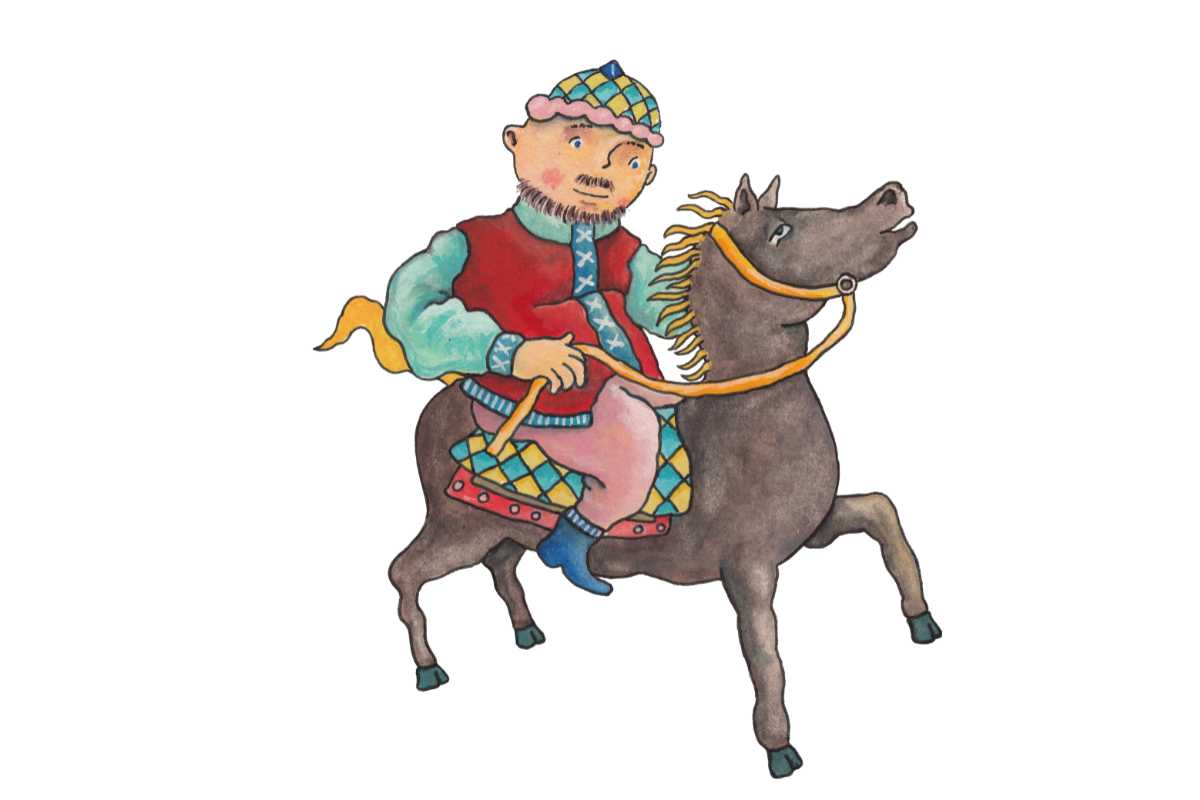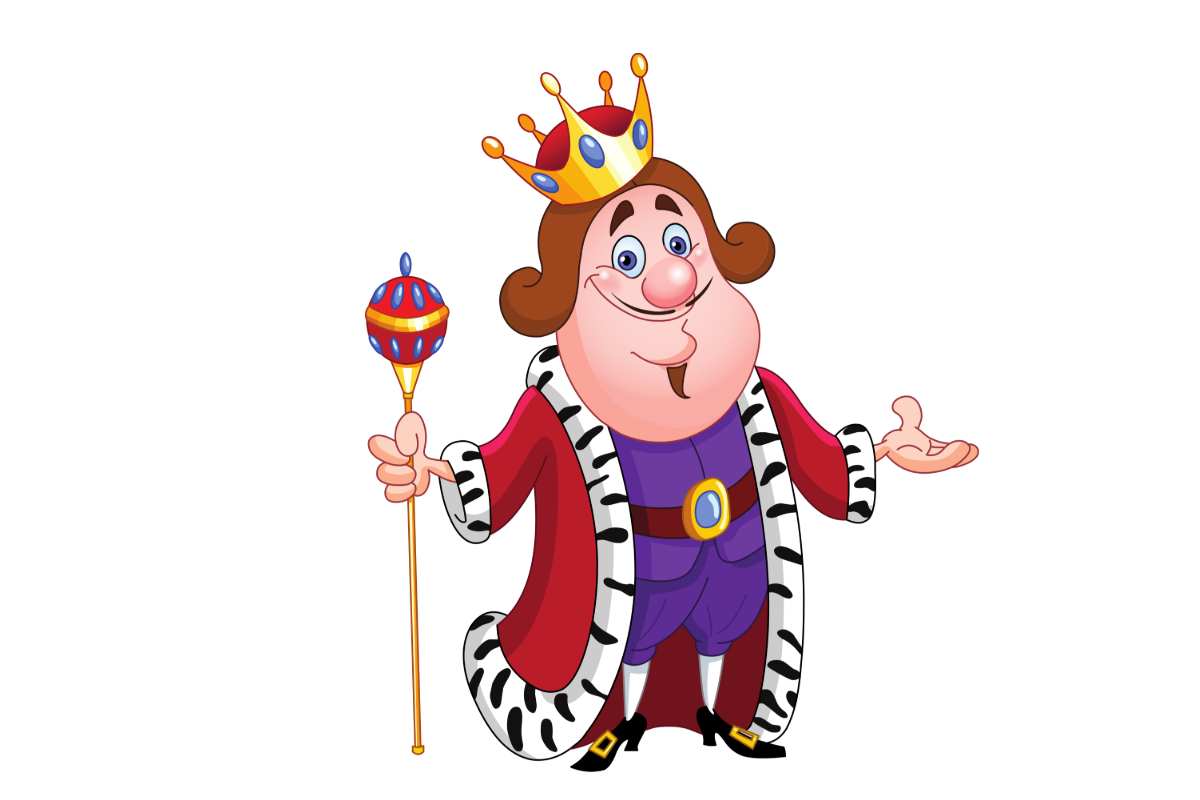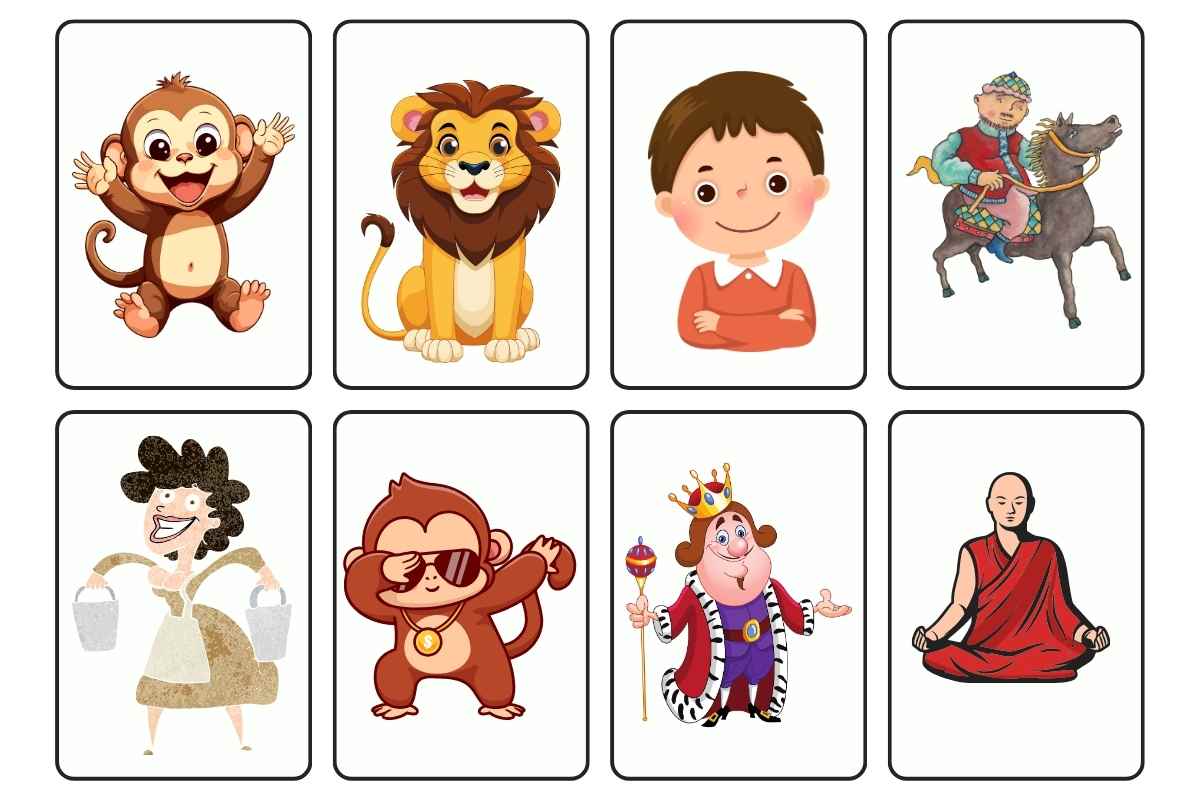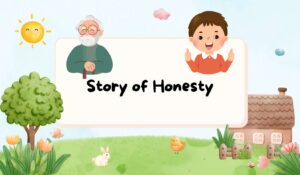A collection of 10 Lines Short Stories With Moral For Kids. Each story aims to both entertain and impart essential concepts in a simple and fun way. These stories, featuring wise animals and bright children, seek to teach ageless morals such as honesty, kindness, perseverance, and more. Let’s take an adventure through these small stories with great teachings, ideal for young brains eager to learn and grow. Prepare to explore the magic of storytelling, complete with morals that will stick with you long after the stories are told!
The 10 Lines Short Stories With Moral For Kids” is written below
The Monkey and the Wedge
Once upon a time, some monkeys were living happily on a big mango tree. Among them, there was a very playful and mischievous monkey who loved to play with everything.

One day, the monkeys noticed that there was some building work happening in a nearby village. Curious, they went to explore when the villagers were away for lunch. The naughty monkey, always looking for something interesting, found a piece of wood that was partly cut with a wedge stuck in it.
The mischievous monkey thought, “What will happen if I take out this wedge?” So, he pulled and pulled until the wedge came out. But, oh no! The cut wood closed quickly, and the naughty monkey’s leg got trapped. He felt a sharp pain and cried out for help.
With great effort, the monkey managed to free his leg, but it was hurt badly. The playful monkey learned a valuable lesson that day about being careful and not meddling with things that could cause harm. From then on, he became more cautious and didn’t let his curiosity get him into trouble again.
The moral of the story is: “Be careful and think before you play with things. Sometimes, curiosity can lead to trouble, so it’s important to make safe choices and avoid doing things that could hurt you or others.”
The Lion and the Bull
Once upon a time, there was a lion king who went to a river and got scared by a loud noise. His wise advisor figured out that it was just a bull making the noise. A clever jackal said the bull was a gift from God to protect their kingdom.

The lion was happy and became pals with the bull. He spent a lot of time with the bull and even stopped hunting. But, the lion’s advisors got hungry and wanted to trick the lion.
They told the lion that the bull wanted to be the king. At the same time, they went to the bull and lied, saying the lion planned to harm him. This made the lion very angry. The bull and the lion fought, and the lion chased the bull away.
Later, the lion realized he made a mistake. He felt sad because he lost a good friend. The story teaches us that we should be careful about believing gossip and not let misunderstandings ruin our friendships.
The moral of the story is: “Don’t let rumors and misunderstandings ruin your friendships. It’s important to trust and communicate with your friends before believing things that might not be true.”
The Good Pupil
Once upon a time, there was a wise teacher who had many students. He wanted one of them to marry his daughter. To find the best match, he came up with a plan.

The teacher pretended to be poor and told his students that he couldn’t give his daughter any gifts for her wedding. He asked them to secretly take some clothes from their relatives’ houses without getting caught. Almost all the students did as he asked, but one student came back with nothing.
When the honest student returned empty-handed, he told the teacher that even though no one saw him, his conscience didn’t allow him to take anything without permission. The teacher was happy with the honesty of this student.
Then, the teacher revealed that it was all a test. He asked all the students to return the things they took. The teacher was so impressed with the honesty of the one student that he decided to marry his daughter to him. The story teaches us that honesty and integrity are important qualities, and good things happen to those who are truthful.
The moral of the story is: “Honesty is a valuable trait. Being truthful and having a clear conscience is more important than getting something through deceit. In the end, honesty is rewarded with trust and good things.”
The Great Horseman
Once upon a time, a man was in the woods, and some bad people hurt him. Luckily, kind people from a nearby village saved him. They didn’t know he was the king because he didn’t tell them.

One villager took care of him at his home until he got better. When he was well, the man left the village. Before he left, he told the villagers that his name was Mahashvaroha (The Great Horseman). He said, “When you come to town, tell the person at the entrance my name, and they will take you to me.”
A few months later, the king decided to make people pay more taxes in his kingdom. The villagers remembered the man they had helped and realized he was the king. They went to the villager who took care of him and told him the news.
The villagers went to the town and said the magic words at the entrance. The king welcomed him, and they talked about the taxes. The kind man explained how the higher taxes were hard for the villagers, and the king agreed to get rid of them. The story teaches us that helping others can lead to good things in return.
The moral of the story is: “Being kind and helpful to others can bring positive outcomes. The man’s act of kindness towards the king when he was in need led to the king listening to the villagers’ concerns and making a fair decision about the taxes.”
The Milkmaid and her Pail
Once upon a time, there was a girl who had worked hard in the fields all day. On her way back home, she carried a big pail of milk on her head. As she walked, she started thinking about all the things she could do with the money she would get from selling the milk.

She imagined, “I can turn this milk into butter and sell it. Then, I’ll use the money to buy eggs. The eggs will hatch into chickens, and I can sell them to get a pretty dress and a fancy hat with a chip on it.” Excitedly, she thought about how everyone would admire her.
But, as she proudly tossed her head, the pail of milk fell down and spilled. The story teaches us that it’s important to focus on what we are doing instead of getting lost in dreams and thoughts, or we might end up losing what we have.
The moral of the story is: “It’s important to stay focused on what you are doing and not let daydreams distract you. Losing sight of the present can lead to unexpected mistakes and disappointments.”
A Monkey Business
Once upon a time, there was a king who had really pretty and special flowers in his garden, far away in a magical land. In the garden, some monkeys lived there happily. The king had a gardener to take care of the beautiful plants.

One day, the gardener had to leave for a week. He got worried about who would water the plants. So, he had an idea. He told his monkey friends to water the plants while he was away. The head monkey told the others not to waste water. Instead, he told them to pull the plants out of the ground and pour water based on how long the roots were. The monkeys did just that and put the plants back into the soil.
A smart person from the king’s court saw what the monkeys were doing and scolded them. But the monkeys shouted back at him. The wise man left, feeling surprised and confused. The story reminds us that sometimes good intentions can lead to funny actions, and not everyone may understand them.
The moral of the story is: “Sometimes, good intentions may lead to funny or unexpected actions. It’s essential to communicate and understand each other’s perspectives, even if things seem a bit unusual at first.”
Good and Bad Company
Once upon a time, King Dadhivahana was in a boat when he discovered a big, golden mango. He enjoyed eating it so much that he planted its seed in his garden. Before long, the tree grew and started giving sweet, golden fruits.

Other kings got jealous of King Dadhivahana’s tasty mangoes. They asked a gardener to make the mangoes not taste good. The gardener became friends with the king and planted bitter neem trees and other creepers around the mango tree. Over time, the mangoes started to taste bitter.
The gardener got scared of being punished, so he ran away. The king, realizing what happened, ordered all the bitter neem trees to be taken away from the mango tree. With good care, the mango tree started giving sweet fruits again. The story teaches us that with proper care and kindness, things can get better even if they go wrong for a while.
The moral of the story is: “Even when things go wrong, with care and effort, they can be made right again. Kindness and proper attention can turn a difficult situation into a better one.”
The Ace Bowman
Once upon a time, there was a king with two sons. The older one, Prince Asadrisa, went away to study different things. He became really good at many skills. When the king got old, he wanted Asadrisa to be the new king, but Asadrisa said no. So, the younger prince became the king.

After the old king passed away, the younger prince didn’t like his brother anymore. Asadrisa left and went to a kingdom far away. There, they saw how good he was at shooting arrows and made him the chief commander of the army.
Many years later, Asadrisa heard that his brother’s kingdom was in trouble. He went there and fought bravely to chase away the enemy soldiers. His younger brother realized he was wrong and asked Asadrisa to be the king. But Asadrisa said no and didn’t want to rule the kingdom. The story teaches us about forgiveness and doing what is right, even when others have treated us badly.
The moral of the story is: “Forgiveness and doing what is right are important. Even when someone has treated you badly, it’s good to help them when they need it and not hold onto anger or revenge.”
The Sage who was a Cheat
A long time ago, there was a tricky person who pretended to be a wise sage. A wealthy man really liked the sage and even built a special place for him called a hermitage. This rich man had a lot of money, so he buried it in the hermitage.

The tricky person, pretending to be a good sage, noticed where the money was hidden. One day, he dug up the money and buried it outside the hermitage. Later on, he told the rich man that he was going on a journey. While leaving, another person saw him and felt something was not right. This person told the rich man about his suspicions.
Worried, the rich man checked on his money and found it was gone. They went after the tricky sage and caught him. They were angry and gave him a good scolding. Finally, the tricky person admitted where he had hidden the money, and they found it. The story teaches us to be careful and not trust everyone, especially when it seems like they might be up to no good.
The moral of the story is: “Be cautious and wise in whom you trust. Not everyone who appears good may have good intentions, so it’s important to be careful with your trust and belongings.”
Thank You for Reading the Story from here ☺ if you really wanna get updated, You could also join us on Pinterest by clicking the link below.
| Click Here | |
| Homepage | Click Here |
FAQs on 10 Lines Short Stories With Moral For Kids
Q: Why are short stories with moral important for kids?
A: Short stories with moral help kids learn important life lessons in a fun and engaging way. They can teach values, empathy, and problem-solving skills.
Q: What are some popular moral themes in short stories for kids?
A: Popular moral themes in short stories for kids include honesty, kindness, bravery, friendship, perseverance, and the importance of sharing.
Q: How can I use these short stories to teach morals to kids?
A: You can use these short stories to initiate discussions with kids about the moral lessons, ask them questions about the characters’ actions, and encourage them to think about how the story applies to their own lives.








